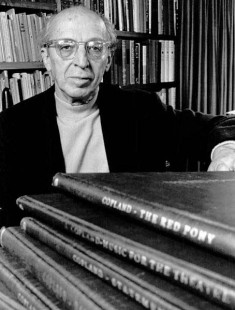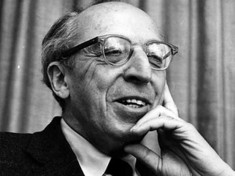| Aaron Copland | |
|---|---|
 |
|
| Composer | |
| Specialty | Composition teacher, writer, conductor |
| Born | Nov. 14, 1900 |
| Died | Dec. 2, 1990 |
| Nationality | American |
Aaron Copland was a famous American composer of the 20th century. In fact, his life spanned almost the entire century. He was born on November 14, 1900, in Brooklyn, New York. His parents were first-generation Jewish immigrants from Lithuania. As was typical for children in those days, Copland was introduced to the piano early in life. His elder sister could play and also taught him.
Early Years
Making music was a far more important part of everyday live for people in the early 20th century than it is for people today. By the time Copland reached the age of 17, he was an accomplished musician and had begun a little composing on his own. He decided that he wanted to pursue composing as a career and began taking lessons from a well-known Manhattan music instructor, Rubin Goldmark.
In addition to taking lessons, Copland spent a great deal of time attending musical performances both at the Brooklyn Academy of Music and the New York Symphony. In these esteemed and distinguished settings, he became familiar with the works of both classical and contemporary composers.
Studying in France
When Copland completed his lessons and felt he had gained as much knowledge as possible for the moment in New York, he traveled to Europe to take in the musical atmosphere of Paris. At the age of 20, he attended a prestigious school for American students in Fontainebleau, France, named the Fontainebleau School of Music. During this time, he sold his very first composition to a respected French music publisher, Durand and Sons.
Beginning of a Career
Upon Copland’s return, he began teaching music. It was during this time that Copland also began his own career as a serious composer. He wrote the first of his beloved pieces while supporting himself as a music instructor. In 1925, he sold his first full length composition in America, Symphony for Organ and Orchestra, to the Boston Symphony Orchestra. This was the start of Copland’s long and illustrious American career.
In addition to composing, Aaron Copland instructed and supported many aspiring young artists who later became some of the most revered composers and musicians of the 20th century. In fact, he and his friend, Roger Sessions, were dedicated to assisting and introducing young artists. To this end, they collaborated on creating concerts and arranged for the Yaddo Festival of American Music of 1932.
Copland’s Composition Style
 Many people today remember Copland for his jazz compositions. Indeed, the early years of his career focused strongly on jazz because he felt that it represented a truly American, nationalistic sound. Nonetheless, Copland did have other strong interests. In addition to jazz compositions, he was also quite enamored of popular folk music and other types of music from around the world.
Many people today remember Copland for his jazz compositions. Indeed, the early years of his career focused strongly on jazz because he felt that it represented a truly American, nationalistic sound. Nonetheless, Copland did have other strong interests. In addition to jazz compositions, he was also quite enamored of popular folk music and other types of music from around the world.
By combining his musical loves, he was able to develop an all new, unique and dynamic style in symphonic music. His 1935 composition, El Salon Mexico, was the first example of this and heralded the beginning of the most productive and well-received phase of his career.
Seeking a Broader Audience
Always seeking new vistas, Copland began branching out into non-symphony applications for his compositions. He wanted his music to be heard and enjoyed by a broad swath of the population. For this reason, he explored the possibilities of composing for ballet and even for film.
Movie scores are among his most popular and well-known compositions. Among these are the 1939 score for Of Mice and Men, the score for Our Town, which was released in 1940, and the score for The Heiress, released in 1949. Copland won the Academy Award for Best Score for his work on The Heiress.
His compositions for ballet were also quite well-received and have become American classics. Among them are Rodeo, introduced in 1942, and Appalachian Spring, introduced in 1944. He proudly received the Pulitzer Prize for Appalachian Spring.
Other Great Works
One unique example of Copland’s work, which is known the world over as an important example of both American composition and culture, is Portrait of Lincoln. Copland introduced this piece in 1942. It is a unique performance piece written for orchestra along with a narrator. It is based on quotes from the writings of Abraham Lincoln accompanied by a haunting and beautiful musical score.
Death and Legacy
Aaron Copland died on December 2, 1990, at the age of 90 in North Tarrytown, New York. The cause of death was due to respiratory failure and Alzheimer’s disease. He had enjoyed a long, successful and proud career. His style was powerful and distinctive and strongly identified with America’s musical style and way of life.